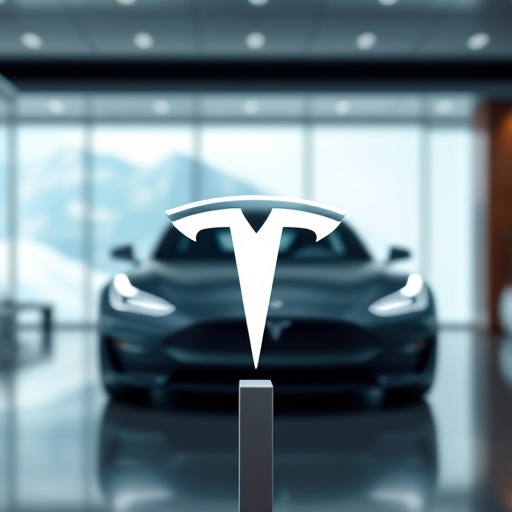In the rapidly evolving landscape of the automotive industry, few companies have captured the global imagination quite like Tesla. Founded in 2003, Tesla has emerged as a beacon of innovation, challenging the traditional paradigms of car manufacturing and redefining what it means to drive in the 21st century. Central to its brand identity, the Tesla logo has become synonymous with this automotive revolution, encapsulating the company’s forward-thinking ethos and commitment to pushing the boundaries of technological advancement.
At first glance, the Tesla logo is a simple yet striking emblem. The stylized “T” is immediately recognizable, exuding a sense of modernity and sophistication. However, beyond its sleek design lies a deeper symbolism that reflects the company’s innovative spirit. The logo, often described as resembling a cross-section of an electric motor, is a testament to Tesla’s roots in electric vehicle technology. This nod to the company’s core focus on sustainable energy and electric propulsion serves as a constant reminder of Tesla’s mission: to accelerate the world’s transition to sustainable energy.
The choice of the logo’s design was no accident. It embodies the essence of Tesla’s pioneering approach to the automotive industry. In an era where traditional internal combustion engines dominated, Tesla dared to envision a future where electric vehicles were not only viable but superior. This vision is embedded in the logo, a visual representation of the company’s commitment to revolutionizing transportation.
Tesla’s impact on the automotive industry extends far beyond its logo. It has fundamentally altered consumer perceptions of what a car can be, transforming electric vehicles from niche products to mainstream contenders. The company’s relentless pursuit of innovation is evident in every aspect of its vehicles, from cutting-edge battery technology to advanced autonomous driving capabilities. By prioritizing performance, design, and sustainability, Tesla has set new standards for the industry, forcing competitors to rethink their strategies and adapt to a rapidly changing market.
The Tesla logo also serves as a symbol of the company’s forward-thinking approach to business. Under the leadership of CEO Elon Musk, Tesla has consistently pushed the envelope, embracing risk and challenging the status quo. Musk’s vision for the company extends beyond cars; it encompasses a broader ecosystem of sustainable energy solutions. This holistic approach is reflected in Tesla’s forays into solar energy and energy storage, further solidifying its position as a leader in the clean energy revolution.
As Tesla continues to expand its global footprint, the logo remains a powerful emblem of its brand identity. It is a symbol of trust and innovation, resonating with consumers who value cutting-edge technology and environmental responsibility. The logo’s simplicity belies the complexity of the company’s mission, serving as a visual shorthand for a brand that is constantly pushing the boundaries of what is possible.
The impact of Tesla’s innovation is not limited to its products alone. The company has also revolutionized the way cars are marketed and sold. By eschewing traditional dealerships in favor of direct-to-consumer sales, Tesla has streamlined the buying process, offering a seamless and user-friendly experience. This approach not only enhances customer satisfaction but also aligns with Tesla’s commitment to efficiency and transparency.
Moreover, Tesla’s emphasis on software updates and connectivity has redefined the concept of vehicle ownership. Unlike traditional cars, which remain largely static after purchase, Tesla vehicles are dynamic, evolving over time through over-the-air updates. This capability allows Tesla to continuously improve its vehicles, adding new features and enhancing performance without requiring owners to visit a service center. Such innovation not only enhances the driving experience but also extends the lifespan of the vehicles, further reinforcing the company’s commitment to sustainability.
In the broader context of the automotive industry, Tesla’s influence is undeniable. Its success has spurred a wave of innovation, prompting established automakers to accelerate their own electric vehicle programs. The company’s bold vision has set a new standard for what consumers expect from their vehicles, pushing the entire industry toward a more sustainable future. In this sense, the Tesla logo is more than just a brand mark; it is a symbol of a movement, representing a paradigm shift that is reshaping the automotive landscape.
The narrative of Tesla’s rise is a testament to the power of innovation and the importance of forward-thinking leadership. It is a story of a company that dared to challenge convention and, in doing so, changed the world. As Tesla continues to push the boundaries of what is possible, the logo will remain a constant reminder of the company’s commitment to innovation and sustainability.
In conclusion, the Tesla logo is a fitting emblem for a company that is at the forefront of the automotive revolution. It symbolizes the brand’s dedication to innovation, sustainability, and forward-thinking, encapsulating the essence of a company that is redefining transportation for the modern age. As Tesla continues to lead the charge toward a more sustainable future, the logo will undoubtedly remain a powerful and enduring symbol of the company’s groundbreaking achievements and vision for the future.

Leave a Reply